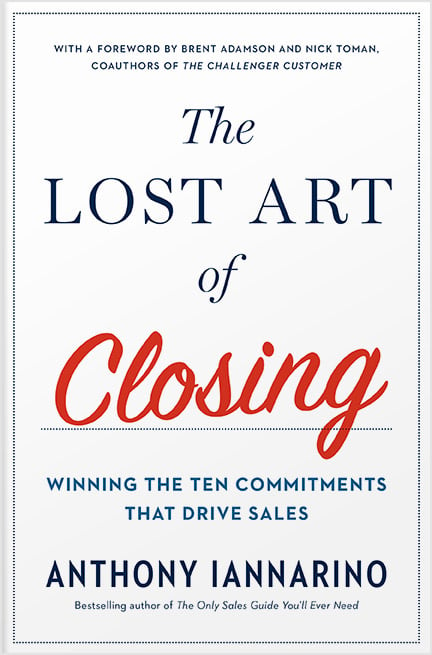The Gist:
- How do you use your relationship capital?
- Your relationship capital degrades over time.
- All things being equal, relationships win. When they are unequal, relationships still win.
You have taken good care of your client for a very long time, developing precious relationship capital. You are known, liked, and trusted, mainly because you have consistently helped your client produce better results. Even though you never keep score (and never should), you have contributed enough to the relationship that you have a rather large balance, should you ever need it.
One of the reasons salespeople struggle with relationship capital is because they never receive a formal balance statement. Many also worry that they’ll deplete their entire balance in a single ask, something that isn’t very likely. After all, what is the point of having relationship capital if you can’t call on it when you need it?

Principles of Relationship Capital
Principle 1: Make Regular Deposits: Relationships come with a price that is paid with time, energy, caring. For commercial relationships, you also need to create value. Whatever form that value takes, you need to make consistent deposits into your accounts.
Principle 2: Larger Deposits Create More Capital: There is every reason to believe that commercial relationships still benefit from being known, liked, and trusted. But unless you also create commercial (economic) value, your deposits are too small to cover a withdrawal used for a commercial outcome. The greater your contribution to your contact’s results, the larger the deposit.
Principle 3: Your Capital Deteriorates Over Time: There is a form of inflation when it comes to relationship capital. The more time that passes without new value, the more certain you can be that your balance is deteriorating—or has already disintegrated. Principal not used is often lost.
Principle 4: Make Withdrawals Close to Deposits: Because your balance deteriorates over time, withdrawals need to be made close to your deposits. Saving a person’s life will create a large enough balance that you can call on them far into the future. But helping a person with a business challenge ten years ago, with no consistent deposits since then, may be too old a deposit to allow a large withdrawal.
Principle 5: You Can Overdraft Your Account: You can overdraft your account by making an out-sized ask of the person and your relationship. Consider how difficult the ask is, how much risk it requires, and how much of your contact’s own relationship capital they will need spend on your behalf.
Principle 6: Your Contacts Also Have a Balance: In a healthy professional relationship, both you and your contact have deposited relationship capital. You may ask to spend some of your balance, and your contact also has the right to spend some of theirs.
Principle 7: Know Your Balance, but Never Keep Score: You will never have relationship capital just by trying to build relationship capital, only by genuinely caring about the other person. Anything you do to create an obligation from another party is at odds with building relationship capital. It’s like trying to deposit Monopoly money.
Principle 8: You Cannot Spend an Empty Account: There will be times when you really need a balance in your relationship account, only to realize that it’s empty—and that it’s too late for you to start making deposits. When there is nothing in the account, you are facing something like relationship bankruptcy.

When and How to Use Relationship Capital
One of the difficult challenges of relationship capital is when and how to use your balance. Some refuse to touch their balance, not recognizing that it can deteriorate over time. Others make a single ask that strongly depletes their balance, without recognizing that their spending is outpacing their saving. Here are a few areas where you might consider using your relationship capital.
Referrals: When you have helped your contact achieve a certain result, you might consider what is almost certainly a small withdrawal: asking them to introduce you to someone they know will benefit from working with you. One of the reasons people struggle to ask for a referral is because they waited too long to ask (see Principle 3).
Access: Anyone pursuing a land and expand strategy would do well to spend their relationship capital to get help accessing other areas of their client’s organization. If that thought scares you, try approaching the request for introductions as both a withdrawal and a deposit, as it should be both.
Problems: Executing solutions for your clients is never easy. But you can make it somewhat easier when you spend relationship capital to obtain the time you need to make corrections, the help you need to deal with other stakeholders, and the resources you need to help your clients make the changes they need before you can help them succeed.
Retention: When your accounts are under attack by your rivals, it is helpful to have made deposits in a vast number of relationships, so you can get others’ help beating back your competitor’s attempt to displace you. When you struggle here, it is because you haven’t made large enough or frequent enough deposits (see Principles 1, 2, and 8).
All things being equal, relationships win. All things being unequal, relationships still tend to win. In sales, it is your responsibility and your obligation to make all things unequal. You have no relationship capital with any company; you only have relationship capital with people. It is possible to wire the building by creating relationships throughout the company, building a large number of accounts with an equally large number of people by creating value for them. There has never been a time when relationships were not important to success, but they will be increasingly important in a future where you are either super-transactional or super-relational.
Do Good Work:
- How do you create relationship capital as part of your success?
- What outcomes are worth investing your relationship capital in?
- What accounts have you allowed to go without a significant deposit?

Essential Reading!
Get my 2nd book: The Lost Art of Closing
"In The Lost Art of Closing, Anthony proves that the final commitment can actually be one of the easiest parts of the sales process—if you’ve set it up properly with other commitments that have to happen long before the close. The key is to lead customers through a series of necessary steps designed to prevent a purchase stall."
Buy Now








.jpg?width=768&height=994&name=salescall-planner-ebook-v3-1-cover%20(1).jpg)


